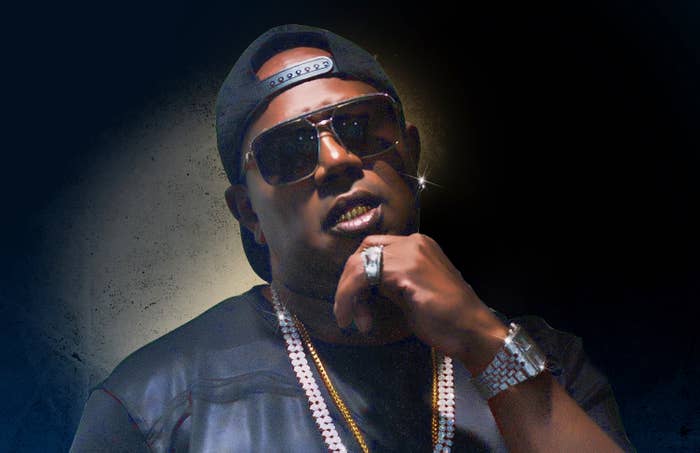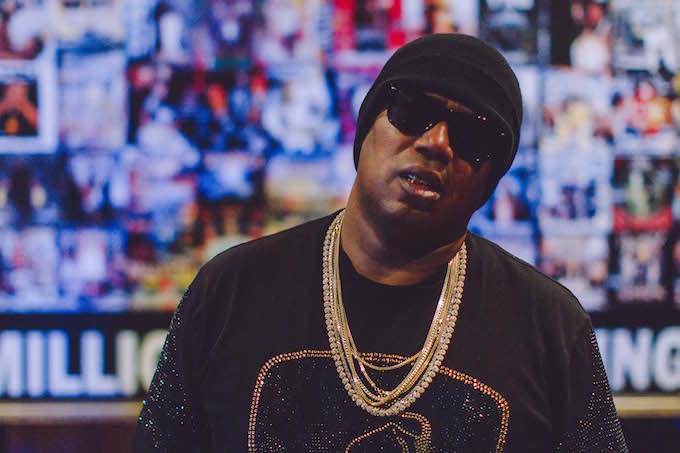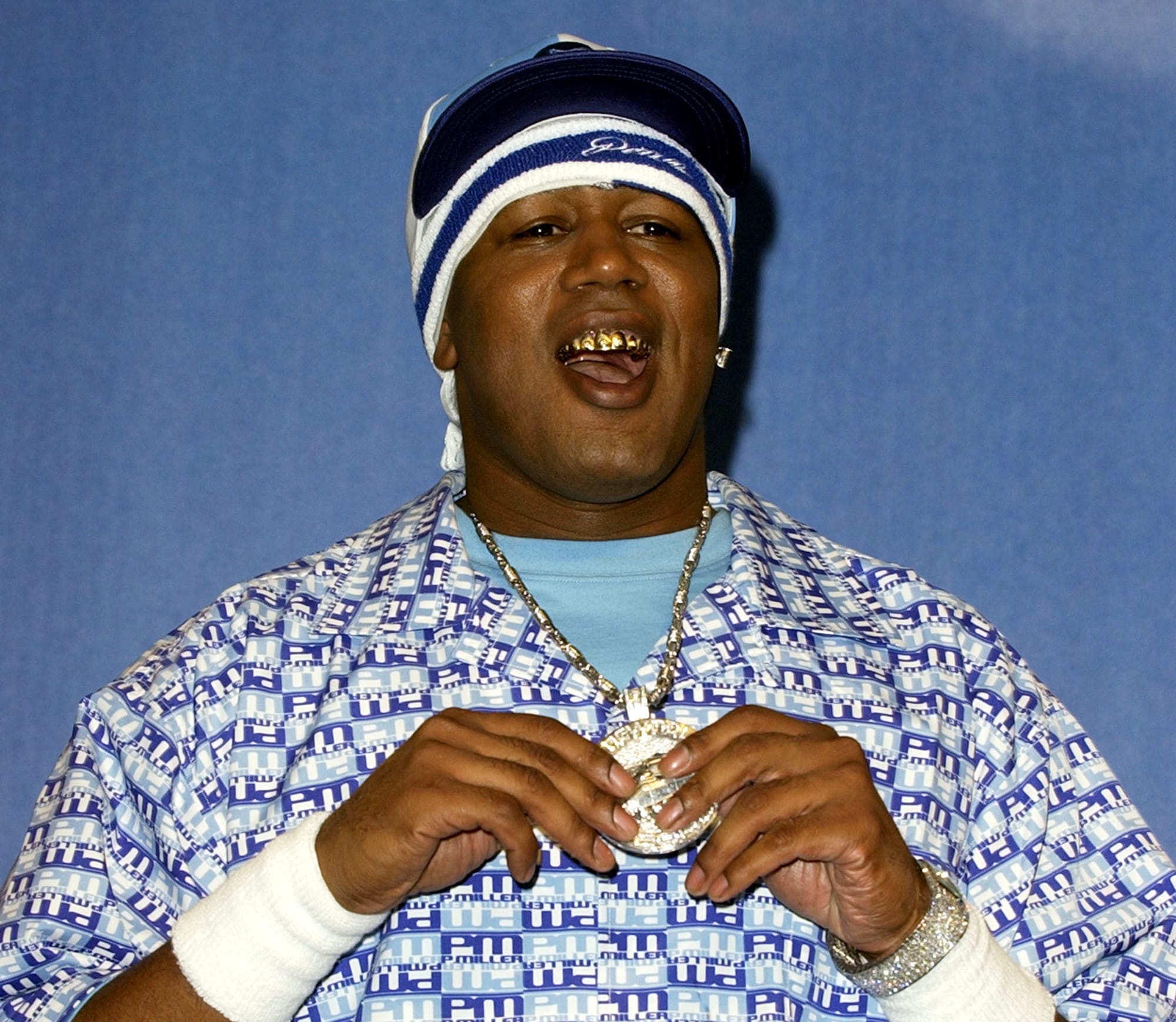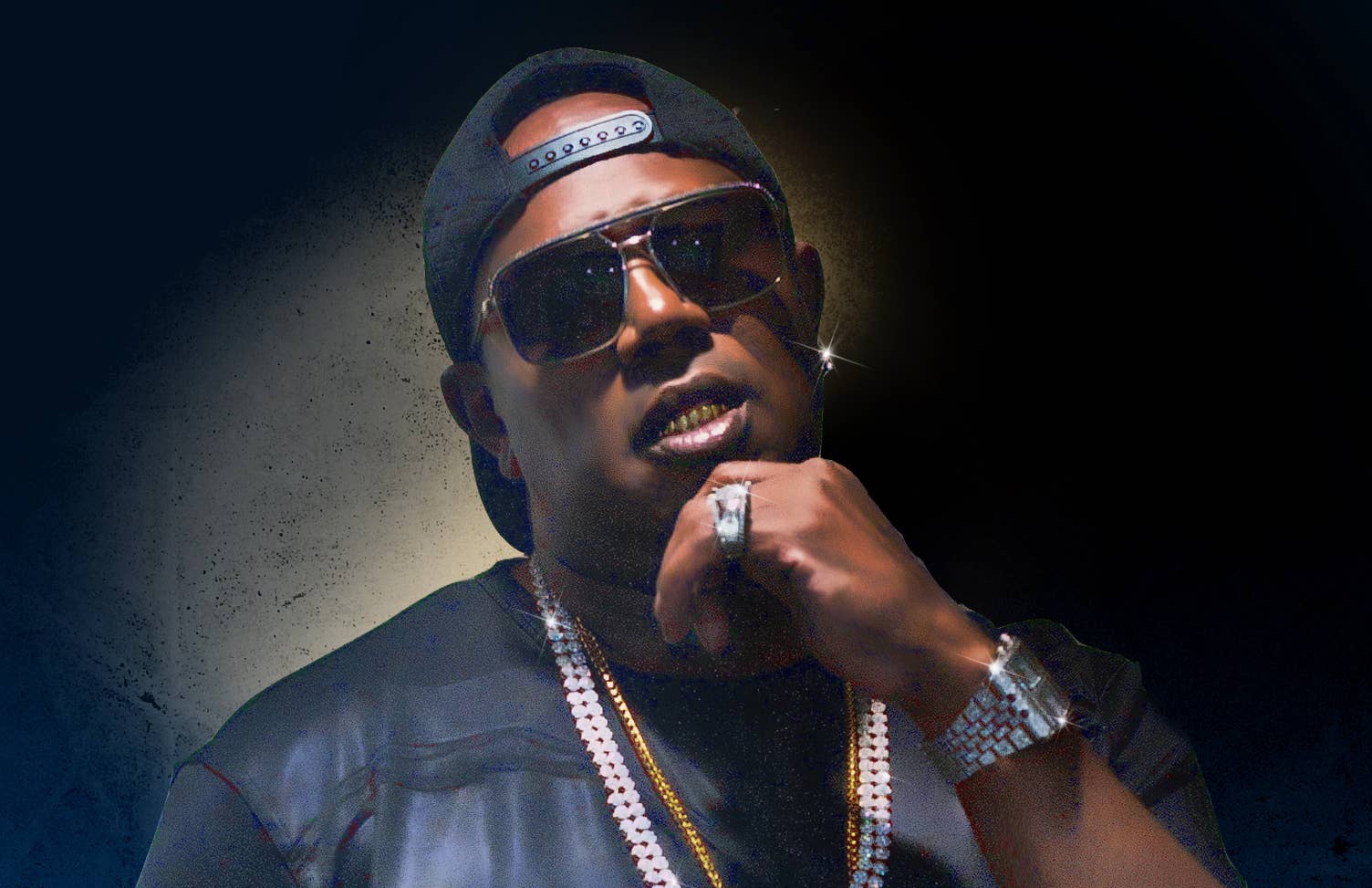
Master P may not be dominating the Billboard charts like he was in No Limit’s late 1990s heyday, but that doesn’t mean he’s any less prolific. When he stopped by Complex for a recent visit, he filled us in on a whole bunch of in-progress film projects, including a sequel to his 1998 film I Got the Hook Up (see a trailer below), a documentary, a biopic, a comedy with Mike Epps, a Rush Hour-style project with Michael Blackson, and a movie called Get the Bag that he describes as “the 2019 Set It Off.” For the last of these, he says he has Taraji P. Henson already signed on, and is “looking to get Iggy Azalea and maybe a role for Cardi B.”
But before all the movies, there was the music. Master P was the founder and head of No Limit Records. The iconic record label was strongly associated with P’s native New Orleans, though its first few years were actually spent in Richmond, California, where it grew out of a record store he ran in the city, also called No Limit. Complex spoke with P about the entire scope of his career, from record store owner to music mogul and beyond. We also discussed some of the incredible talents he’s worked with over the years, from his brother C-Murder to New Orleans icon Soulja Slim to Solange. Here is the man who made us all say “Uhhh,” Master P.
This interview has been lightly edited for clarity and length.
Tell me about your upcoming documentary.
The title is From the Hood to Hollywood. I came from nothing. I came from the bottom in the South. So to be able to do your own documentary and be alive, with all the stuff that I’ve done, is a blessing. I know it's nothing but the man up above that spared my life. I had to make changes in order to be here and do this. And man, I done seen a lot. I want people to know that you can come from nothing and be in Hollywood, if you are willing to make changes in your life. That's what I want people to get out of this documentary: you can make it if I made it.
What period of time does it cover?
It covers from me being a kid all the way till now.
When will we get to see it?
2019. I'm looking at coming back from Sundance and then putting it in a couple theaters and then TV.
You just talked about making changes in your life and not thinking you would make it this far. Hearing that reminds me that in 1990, your brother Kevin was killed. What was it like not having him around as you were building No Limit?
It was hard. That's what made me say, I need to change my life and let my brother’s life live on through me within the music. That's when I really got serious about the music business. I realized you won't make it too long in the street life, and I had to find something that I could do—something legit that I could feed my family off of, but I didn't have to look behind my back and over my shoulder. So I really started getting into the music. A lot of songs were inspired by him. “I Miss My Homies,” that was all about him. It had an impact on my career.
At the time he got killed, did you already have your record store?
Yeah, I had the record store at that point. I closed it down maybe a year or two later. I just wanted to focus on the music and get out there, and that's what I did. I started opening up for 2pac, and I went from having no fans to millions of fans.
What were those early shows like? I read that people didn't really know what to make of you.
Nobody knew me! They thought I was a country singer, because the guy who used to introduce me when everybody would be waiting for 2Pac would say, "Next to the stage is Mr. P the country singer." I'm like "Man, its Master P and I'm a hip-hop artist." He didn't realize they had rappers from New Orleans. They thought you either have to be from New York or LA. So me being from New Orleans, they were like, "What are you? A blues singer or a country singer?"
I overcame that hurdle. I used to come out for 2pac when the lights were still on. There was one guy dancing, and I told my brother, "I'm going to turn that one fan into millions." So that's what I did. And you got to remember: I was in Richmond, California. I got gold teeth, I'm from the South, I'm just an oddball. They've never seen nothing like me before. Now when you look at the Bay, everyone got gold teeth and dreads. It's funny because when I was there, they didn't understand me, and now everyone in the Bay looks like that.

How did you end up opening for Pac?
Both of us being in the Bay. I was tight with Spice 1, and E-A-Ski was my producer. They used to come in my record store. I'd put their records in there. And then one day they were like, "Man, do you want to come open up?"
What lessons did you learn from owning a record store that helped you when you became an artist yourself?
One thing I learned: I told people when I had 2Pac, Scarface, NWA, and Eazy that all the album [covers] was dark. You could barely see it in the store. It was a problem for the consumers. I said, I need to lighten these records up so you can see them. When I came up with my logo for No Limit, I had the tank with the two people on it, and I wanted to make it in diamond. I had a gold and diamond watch, so I called the guy and said, “You said you can make anything. Can you bling my logo out?”
How did he react when you said, “I want a diamond tank?”
He said, “Man you crazy. This don't make no sense.” Mind you, I'm on the phone and Pen & Pixel [graphic design firm] was in Houston. Two young white guys on the phone are art directors and they're like, "I don't understand what you're saying." And I said, "I want diamonds on my logo." He said, "Diamonds on your logo like what? Send me a picture." So I sent him a picture of my watch and I said, "If you can do that." And everything we did from there, we blinged it out.
There was one guy dancing, and I told my brother, 'I'm going to turn that one fan into millions.' So that's what I did.
I wanted to ask about [the No Limit group] T.R.U. In the beginning, there were nine people in the group. How did you manage that?
Those were my just my homeboys. All those guys started coming to my store and I was like, you know what, I'mma put a group together—T.R.U. And people don't know what T.R.U. stands for: The Real Untouchables. I wanted to name it just “Untouchables,” but I couldn't because there was already a movie called The Untouchables. People always think the name means “true to the game” or something, but it's “The Real Untouchables.” I got that from the old Elliot Ness movies back in the day.
How did it go from nine members to just you and your brothers?
There was so much competition in the Bay, so a lot of the guys started getting discouraged because the music wasn't popping right off the bat, and they started quitting. By the time I went back to New Orleans, I was like, "I'm going to do this with my brothers."
Your brother’s original rap name was Silkk, right? People just started calling him Silkk the Shocker after he released [his 1996 album]The Shocker.
What happened was, we used to call him Silkk. When he put that Shocker album out, all the fans just started calling him "Silkk the Shocker." We also had to change it because they had an R&B group called Silk. You don't want to get big and then they think you some R&B group.
Early on, there was going to be an album of yours called Lifestyles of the Rich and Dangerous. What was that?
Us wilding out (laughs). We recorded songs, but we never put it out.
The early No Limit stuff is varied. Some of the lyrics are positive and some are even close to horrorcore. The sound is varied too—some songs have a Southern feel, and some sound like music from the Bay. At what point did you realize there was a specific No Limit sound?
When I moved back to New Orleans, that's when I realized. Because some of the music at first was with west coast producers like E-A-Ski. When I got KLC and Beats by the Pound, you start hearing a different sound. My whole thing was, let's go back home because I felt like I needed that Southern sound behind me. Before that, it was all over the place—I'd get a piece from here and there. I’d get music from JT the Bigga Figga. I used to go into the projects by JT the Bigga Figga’s house. They used to be like, "Man, P aint about to come over here." And I'd show up.
The strangest thing about what happened with my career is that they had a lot of talent in the Bay, but for some reason most of them sounded alike. People say, well how come I made it so big? I think it's from me being all the way different. I tell people, sometimes you gotta be different. It may take you a little longer, but by you being different and unique you're going to really blow up. Some people make great songs but they don't blow up ‘cause you done seen it all and heard it all before. By me being country and being who I am, it took my career off bigger than a lot of guys I was around who thought they had more talent than me.
You were in the Bay Area right as MC Hammer was getting famous. What did you learn from seeing him blow up?
I realized that you can't take all those guys with you. He had a good heart. But I don't think he knew when to tell those guys, "You got to get off the bus." I didn't know him, but I seen what he was doing. He helped a lot of people, and in the end when he needed people none of them were there. I took from that, I got to do something different. I love my hood, I love my people, but if they’re not focused and on the same page as me, then I got to cut them off.
The concept of the No Limit soldier comes from your grandpa, right?
My grandpa was in the Vietnam War. He came back home and they were supposed to give him $10,000 to get a house. He never got it, so he was always angry about that. He used to tell me, "When you make it, you start your own army and your own business." So when he passed, I decided to brand my business after all the tanks, because he had a lot of little toy tanks and models around the house. I'm like, "That's my logo, the tank." That's where it all comes from.

You’ve often said that No Limit made street music, but women could dance to it. How conscious were you of that direction?
Yeah. My whole thing was, it got to be hard music, but the girls got to be able to dance to it.
And you told the producers that?
Yeah. I was like, we got to have that New Orleans bounce that they was great at doing. We always controlled that sound.
How did the Beats by the Pound team come together?
I brought them all together by believing in the underdog.
At No Limit’s peak, you guys were putting out dozens of albums a year. On a random day in 1998, what is Percy Miller doing?
In the studio all day. To make that many records and help that many people with their careers, you have to live in the studio like Lebron James lives in the basketball gym. You got to put 18 to 20 hours a day sometimes believing in what you are doing and mastering your craft. So that's where I was. I was either in a basketball gym or at the studio. I was always overseeing.
And then once we signed Snoop to the label, I had to make sure he can make a project we can sell in the South and still work on the West Coast. Being able to get Dr. Dre and all those guys to be on those records with Beats By the Pound, it made the magic happen. We went from selling no records to selling over a hundred million records. At one point they told me I couldn't put out more than one record a year. One time we had over 20 records on the Billboard chart at once.
I was reading an article from the New York Times in 1998, and it said you had a whole bunch of businesses—everything from a Foot Locker to a phone sex company. How involved were you in your businesses back then?
It wasn't a Foot Locker. I created my own thing. It was called "Master Feet." If I didn't have all that, I wouldn't be here right now. Because business goes up and down; if one is slow, then another picks up. People try to figure out, why am I still relevant right now and how can I still make money? It's because I was able to diversify my portfolio.
Now when you look at the Bay, everyone got gold teeth and dreads. It's funny because when I was there, they didn't understand me.
What was the strangest thing you invested in?
The Master P Make ‘Em Say Uhhh doll. People asked me, "Where you going to sell it at?" I made 200,000 of them in China, and they thought I was crazy. I ended up selling all of them to record stores. They told me, “No one is going to buy a Master P doll.” I said, if I sold millions of records, why wouldn't they buy a doll and use it as a collectors item?
For people who aren't from New Orleans, can you tell me what Soulja Slim means to the city?
Soulja Slim was our 2Pac. And the saddest thing is, he was so talented, but he just hung out too much and partied. It catches up with you. It was a terrible loss for our community and our city. You go back and so much talent was just wasted.
Soulja Slim knew the music he wanted, that's how talented he was. He'd walk into the studio with Beats by the Pound and he already had the music in his head. He'd just hum it to them. He was probably one of the most talented guys I ever met. And he’d been through so much. People don't realize when you been through so much pain and struggle, that music just comes out of you. But you gotta make some changes when you want to survive, especially when you're living in a dangerous place like New Orleans.
That has been the greatest thing for me: how to make change, move on, get past this, and grow. But some people just love the environment. Same thing with my brother [C-Murder]—all that talent he had, the environment took him out. Mac, one of the most talented guys hands down from No Limit, he didn't make it. He ended up in prison. He was our Nas back then. The music was conscious but still clubby. He was a genius, but you're not worth nothing in prison.
That's what this documentary is about—to celebrate all of these champions. I mean, Mystikal right now is incarcerated, one of the most talented people you will ever meet. He brought the energy to No Limit.
What’s the latest on your brother’s case?
We waiting for a break right now. If we get a break, that goes to show you: you got to have something else, man. One thing people don't realize about me is that I do believe in God and I don't mind getting in that Bible. I thank the man for letting me survive a lot of these tragedies, because I experienced a lot.
I read that you managed Meek Mill for a while. When was this?
Right before he got with Rick Ross. We had Meek Mill as being one of the biggest artists in the world. [I told him], you can do this on your own. His thing was, he wanted to do a deal with somebody. We just didn’t see eye to eye. I’m like, “I don’t know how you don’t see it. You’re going to be one of the biggest artists in the world. If you don’t see, it that’s on you.”
I told my partner James, "If that’s what you want to do, go ahead and continue with him." But I don’t think we need to go to nobody. Now he started Dreamchasers, which is good. We could have did that then, but sometimes you’re looking for a hit right now. I’m glad it worked out for him the way it did. But I think we could have did some incredible things, with a little more patience.
You had a big part in Solange’s album A Seat at the Table. How did that come about?
Me and Solange have always been friends. I’ve always known she was an underdog and people always looked up to Beyoncé. I said, this girl got talent. She lives in New Orleans now, but we lived in Houston together so she used to come by my house and make music. In L.A., she used to come to the same studio where I would record at.
Can we hear any of the music you made back in Houston?
We got some. Some things didn’t make sense at the time. But there’s a song with me, Silkk, Beyoncé, and Destiny's Child. With A Seat at the Table, I was supposed to just intro a song. She’s always singing “Whodi” on social media—that’s her favorite song. So I was going to come in there and do an intro on one of her songs. And the engineer said, man, this what we need, with her being an African-American Queen, and she’s all about her people and her culture. So I come in there and start talking. She said, “Can you do another song?” Then she was like, “Can you do it on all of the songs?” I’m like, “You my girl and I’m going to do that. I know you a star and I want to see that.” And it just worked. We created something magical, and I’m happy for her. Sometimes life, it just show up.
Tell me about I Got the Hook Up 2.
I Got the Hook Up was so good and Friday was so good that people are saying they don’t make movies like this no more. A lot of these films are watered down—that’s what the fanbase is saying online. We want to see some real urban films and walk out of the theater happy.
Once I started looking into it, I was like, I Got the Hook Up 2, can’t be about the old film. It needs to be about our kids and merging the old with the new. Then I started thinking about DC Young Fly, Fatboy [SSE]—I’m going to take all of them and put them together with John Witherspoon, and we’re going to make an incredible film. That’s what we’ve done. We’re doing a 2019 Harlem Nights—we’re bringing everyone in this film. It’s going to be one of the funniest movies of 2019. It will be in theaters in May.
As we’re speaking, it’s the beginning of the holiday season. What was the inspiration behind the 1994 No Limit Christmas album [West Coast Bad Boyz: High fo Xmas]?
I thought, "We got all this Christmas music, but nothing for the hood?" So I decided, I’m going to do a whole Christmas in the hood. When you’re living like that, it’s just one of those things like, “Let’s do something for our people.” Twenty years later, we’re still giving back to the hood. We created TeamHopeNola.org. This is what owning your own music can do. I can give back to those kids and hopefully they’ll come back and be able to help the next generation. It’s a blessing, man. I’m glad I’ve been able to make a Christmas hood album to be able to help the hood. I feel like the black Robin Hood.
Will we ever get a follow up Christmas album?
You might. It’s going to be a bit lighter though (laughs). It’s not going to be as hard.
The sound of your city is back this year, with artists like Drake and Cardi B working bounce into their music. How do you feel about that?
I feel good because my main guy made those records, BlaqNmilD.
A little while back, you were mentoring Kodak Black for a minute?
Just a little while. Kodak Black is a talented, talented kid. My thing was just showing him other things like financial literacy and taking control of your project. I think now that he went back to jail and came back, you’ll see a different person. Now he’ll say, “That’s what P was talking about.” He’s coming into his own now. I’m happy for him
Tell me your philosophy on ownership.
If you don’t own nothing, you not going to make no money. That’s just plain and simple. So being able to own your product is going to take you far, and you’ll be able to make more money. My ownership is why my career lasted so long. Without ownership, I couldn’t do none of it.
Finally, is there a story behind your famous “uhhh” ad-lib?
That’s my battle cry, all the pain I been through. You know how sometimes people walk outside and they just want to scream? That’s how I get it all out, whether I’m in the basketball court or the gym or the studio.



